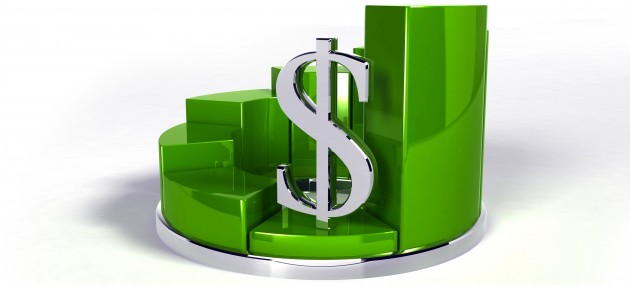Mental Model: Economies of Scale
If you ever took an economics course, you are familiar with the concept of economies of scale. In its simplest form, economies of scale is a phenomenon whereby the efficiency of a large scale producer allows it to spread out the high cost basis of its capital expenditures over a larger per unit basis, lowering the per unit cost.
With economies of scale, a widget that cost $1.00 to manufacture now only costs $0.10. The concept is closely related to something known as operating leverage in finance, which allows you to monitor the revenue in excess of fixed costs to determine the sales threshold below which a company could quickly spiral into losses or above which a business could start minting money.
[mainbodyad]Economies of scale exist in the private world, too. Since economies of scale has been so often discussed in a business context, I’m going to focus on how it can benefit your family on a household level.
In many ways, your household is probably a two-person general partnership with two managing partners (you and your spouse). If you aren’t married, it’s like a sole proprietorship. Once you reach certain economies of scale, it becomes far easier to save money because you are able to invest in higher quality capital expenditures or negotiate from a position of strength. That is why research by professors such as Dr. Thomas J. Stanley show the rich the United States focus on lifecycle cost and not sticker price; why they are willing to invest in higher quality furniture, for example, paying $2,000 for a single side chair.
It is economies of scale that is largely responsible for married couples having far higher net worths, educational attainment, family health, and general success than their non-married counterparts. (Exceptions always exist, we are looking at the macro view of the American population.) Hearing about the poverty of single working mothers is really a story of economies of scale; or lack thereof.
This isn’t news to those who work with families struggling with dire poverty; who talk about the “tyranny of the now”. When someone is poor and doesn’t have a support system, such as a large family with individual branches that are self-sufficient both financially and in terms of human capital (doctors, lawyers, business owners, accountants, etc.), they are often forced to make bad decisions because it solves an immediate need. Instead of buying a good car that will cost far less in gas and repairs per mile traveled, they have to buy a clunker in order to put food on the table tonight. That is the “tyranny of the now”. Just as economies of scale help big businesses and successful families make money, the tyranny of the now acts as quicksand, pulling down those who are below the poverty line.
An Example of How Economies of Scale Help the Rich Get Richer
Here is an example of how economies of scale work from my own life. It happened yesterday. I got a call from our fragrance ladies at Hall’s department store in Kansas City, explaining that the semi-annual 20% coupons had been sent out to regular Hall’s customers. They told me I wouldn’t even have to come into the store – just give them a phone call with whatever I wanted to order and they would have it sent over to me, arriving in a couple of days.

By taking advantages of economies of scale, we were able to pay only 40 cents on the dollar per ounce of Creed Aventus. Small advantages like that add up over time.
First, the phone call came because we are big Creed fragrance customers, as long-term readers of the site know. Many people would have missed the sale. We were notified it was happening. Our past behavior (buying 20+ bottles of Creed) gave us certain advantages; a by-product of economies of scale.
My mom needed a new bottle of Creed Aventus, having gone through her first bottle in very short order. She’s crazy about the stuff. I convinced her the best option would be the 8.4 ounce flacon with a matching atomizer because the per ounce cost would be far lower. Here is a look at the math.
The bottle of Creed Aventus fragrance with the atomizer would normally run $550 plus sales tax, for a total of $600 in Kansas City. Because of the sale, we got it for $488 after taxes. That is an extra $112 in cash saved for future purchases. Let’s take it one step further and look at the per ounce cost of the fragrance by backing out the atomizer. The flacon contains 8.4 ounces of Creed Aventus. After the sale discount and adding back in proportional sales tax, the net cost was $342. Thus, the cost per ounce is just shy of $41.
If someone else who didn’t have a lot of financial resources tried to buy a bottle, they would probably opt for the 2.5 ounce bottle, which retails for $240 plus sales tax, or $261 after sales tax in the Kansas City area. Paying full retail, the cost per ounce would be almost $105.
By purchasing the way we do, we get 250% more Creed Aventus for every dollar spent. When our retail paying friend sprays $1 worth of the fragrance, the same volume of liquid dispensed would cost us only 40¢.
Economies of Scale Add Up Quickly
The economies of scale concept is one of the most important keys to understanding how, and why, the rich get richer. That may seem like a small thing but it’s not. When you go through life and you are getting these kinds of breaks everywhere, from your groceries to your dress shirts, your shoes to your cars, the savings are enormous. I’ve already explained how the home renovations are going to be accomplished for probably 6¢ above wholesale cost. By the time it is done, every $10,000 I spend on home renovations will provide my family with the same amount of upgrades and “stuff” the average person would have had to spend almost $18,000 to enjoy.
To borrow a Biblical parable, like Jesus with the loaves and fishes, a rich man can multiple the purchasing power of $1.00 placed into his hands.
To use a sports metaphor, you can become successful by playing good offense (making more money) or playing good defense (being brilliant at getting things for a fraction of their retail cost). Many wealthy individuals and families do both really well.

Economies of scale are just as powerful in building wealth for your household as they are in making a company financially successful. Image © Shutterstock
There Are Ways to Enjoy Economies of Scale If You Aren’t Yet Wealthy
With a little creativity, those of you who aren’t yet overseeing a large enough balance sheet and income statement to enjoy economies of scale can still capture some of the benefit.
- Take advantage of co-ops and mutual companies that are owned by their customers. These buying groups have tremendous pricing power by consolidating the much smaller purchasing power of their individual members.
- Search bankruptcy liquidation and auction sales.
- Join with other people to make bids for things you want, creating your own ad hoc co-ops.
- Look for “special” deals few people realize exist. For example, if you are a housewife, become a registered interior decorator and you can often enjoy 20% to 30% discounts at almost all major stores using your “to the trade” pricing.
- Avoid credit card debt and pile up savings to buy in bulk when opportunities present themselves. In the midst of the Great Recession, there was a distributor who was liquidating nearly $200,000 worth of retail value merchandise we were able to get for only $24,000. We showed up with a check, signed and countersigned. It was a relatively small deal but the excess profit alone on this particular item meant tripling to quadrupling our initial investment in under 24 to 36 months. The only reason we could take advantage of it is because we were armed with liquidity when the ephemeral opportunity appeared. A lot of those small advantages, over time, make an enormous difference in your ultimate net worth.
Economies of scale are self-reinforcing and powerful. If I wanted to launch another business tomorrow morning, it would be far easier because I could take advantage of the existing office space, infrastructure, copy machines, computer systems, accountants, lawyers, and experience we already have in our existing businesses. It can leapfrog me years ahead in the process of growing the new business.
One of the first things I think about when I start a project is, “How can I harness the benefits of economies of scale? How big are they in this particular field?”. Then, like a huntsman bridling a horse, I find a way to do it. As I’ve always taught you, money is only a tool. Economies of scale is one of the fastest and simplest ways to harness it.
[mainbodyad]


